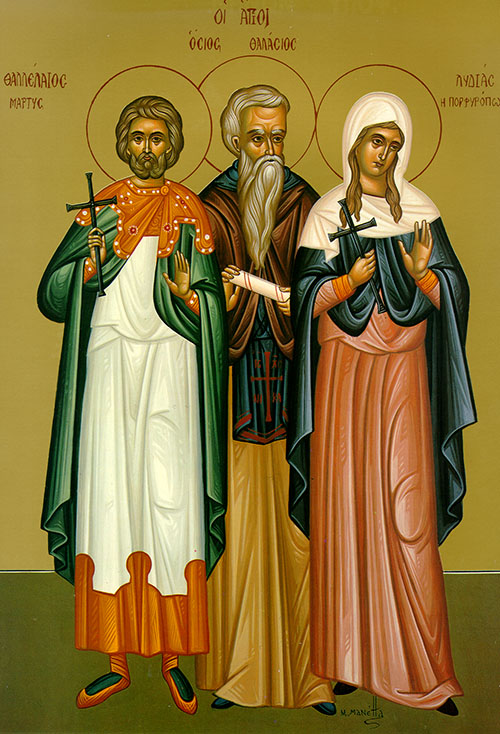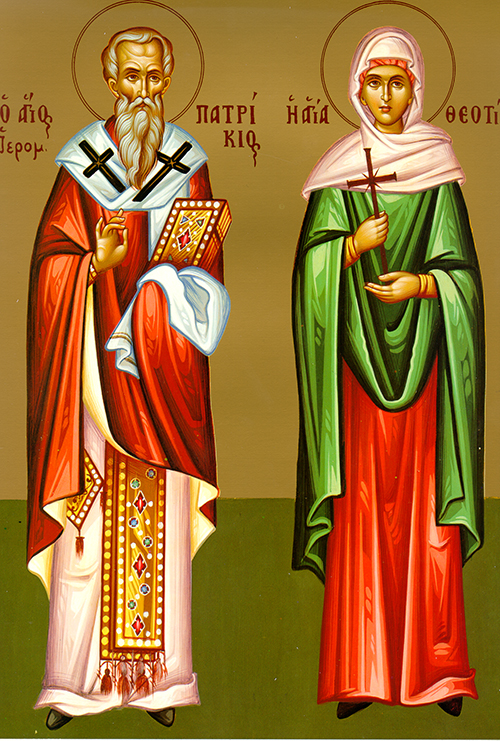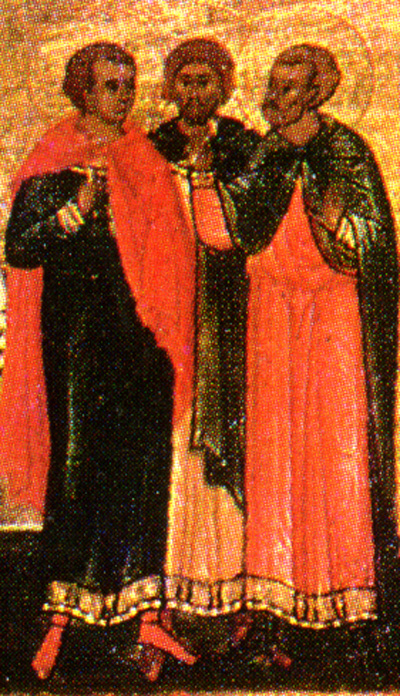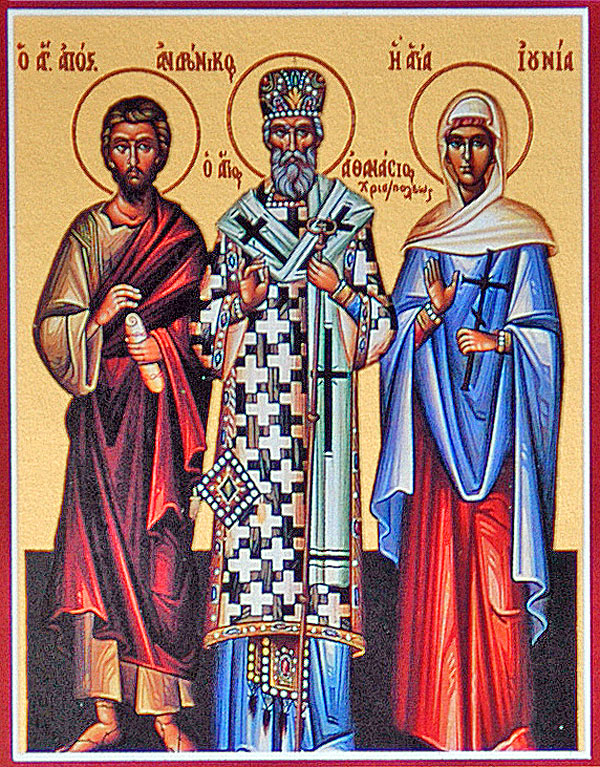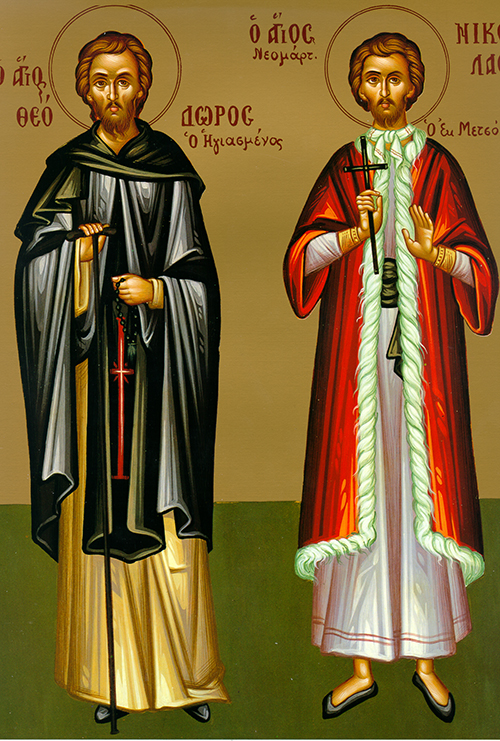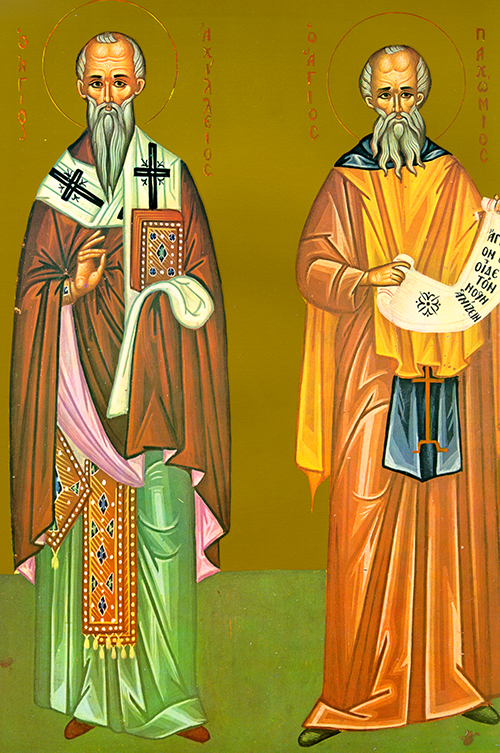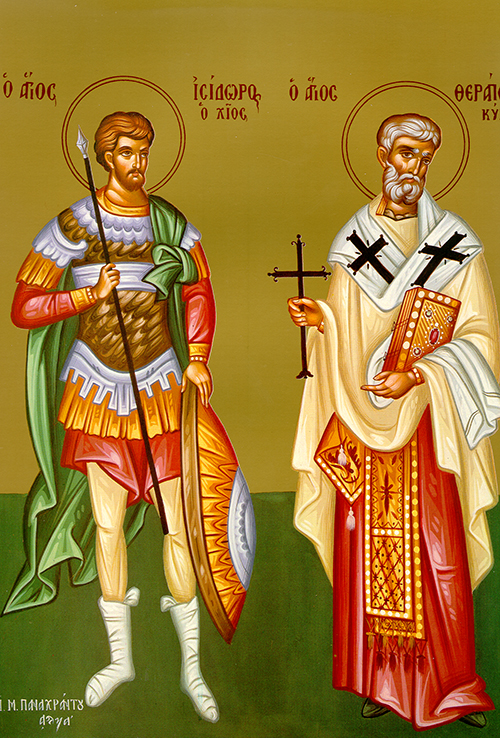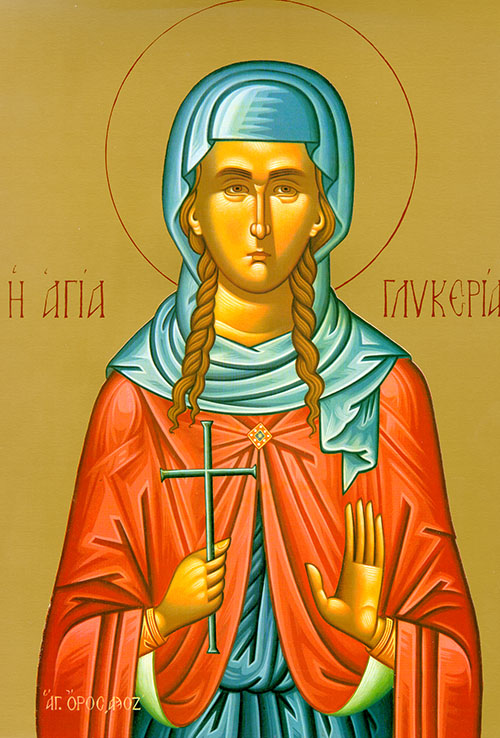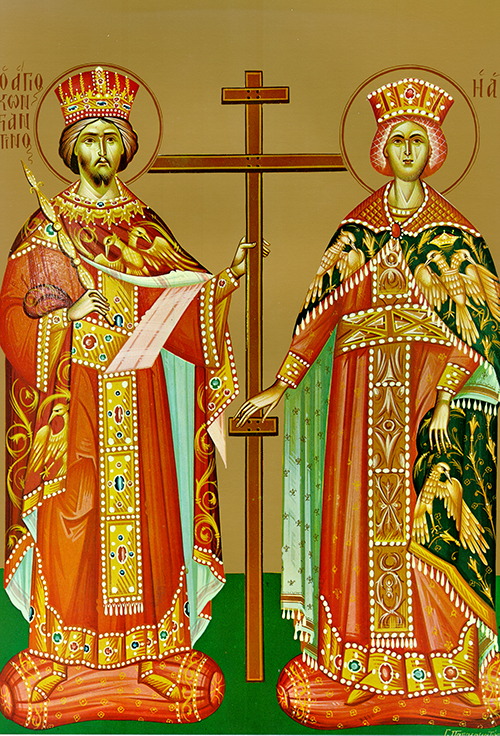

The holy Emperor Constantine reigned in ancient Rome and in Byzantium (which became New Rome), and was the first Christian emperor and champion of the Faith. Though he was not baptized until on his deathbed, he considered himself a Christian, and called the First Ecumenical Council at Nicea in 325 to settle the Arian heresy.
On the Via Labicana in old Rome, Helen, the mother of emperor Constantine, is remembered. She single-mindedly worked to help the needy and piously visited churches, mingling with the crowds. Having made a pilgrimage to Jerusalem to see the places of the Nativity, Passion, and Resurrection of Christ, she honored the manger and cross of the Lord by building basilicas worthy of respect.
Troparion
Seeing the cross in the sky like Paul, and like him you received a call from the Divine. You committed the royal city into the hands of the Lord. Save this city always in peace, O only Lover of Humankind, through the prayers of the Theotokos.
Kontakion
Today Constantine and his mother Helen reveal the cross, that most precious tree which puzzles the Jews. It is the armor of Christian authority against enemies. It has proved itself awesome in war by its many miracles.
Readings for the feast
Epistle
Acts 26: 1-5 & 12-20
In those days Agrippa spoke to Paul: “You have permission to state your case.” So Paul stretched out his hand and began his defense. “Many charges have been leveled against me by the Jews, King Agrippa. I count myself fortunate to be able to make my defense today in your presence, especially since you are expert in all the various Jewish customs and disputes. I beg you to listen to me patiently.
“The way I have lived since my youth, and the life I have led among my own people from the beginning and later at Jerusalem, is well known to all Jews. They have been acquainted with me for a long time and can testify if they wish, to my life lived as a Pharisee, the strictest sect of our religion.
“On one such occasion I was traveling toward Damascus armed with the authority and commission of the chief priests. On this journey, Your Majesty, I saw a light more brilliant than the sun shining in the sky at midday. It surrounded me and those who were traveling with me. All of us fell to the ground and I heard a voice saying to me in Hebrew, ‘Saul, Saul, why do you persecute me? It is hard for you to kick against the goad.’ I said, at that, ‘Who are you, sir?’ and the Lord answered: ‘I am that Jesus who you are persecuting. Get up now and stand on your feet. I have appeared to you to designate you as my servant and as a witness to what you have seen of me and what you will see of me.
‘I have delivered you from this people and from the nations, to open the eyes of those to whom I am sending you, to turn them from darkness to light and from the dominion of Satan to God; that through their faith in me they may obtain the forgiveness of their sins and a portion among God’s people.’
“King Agrippa, I could not disobey that heavenly vision. I preached a message of reform and of conversion to God, first to the people of Damascus, then to the people of Jerusalem and all the country of Judea; yes, even to the Gentiles. I urged them to act in conformity with their change of heart.”
Gospel
John 10: 1-9
The Lord said, “Truly I assure you: whoever does not enter the sheepfold through the gate but climbs in some other way is a thief and a marauder. The one who enters through the gate is shepherd of the sheep; the keeper opens the gate for him. The sheep hear his voice as he calls his own by name and leads them out. When he has brought out those that are his, he walks in front of them, and the sheep follow him because they recognize his voice. They will not follow a stranger; such a one they will flee, because they do not recognize a stranger’s voice.”
Even though Jesus used this figure with them, they did not grasp what he was trying to tell them. He therefore said to them again: “My solemn word is this: I am the sheepgate. All who came before me were thieves and marauders whom the sheep did not heed. I am the gate. Whoever enters through me will be safe. He will go in and out, and find pasture.”
Readings for the day
Epistle
Acts 13: 13-24
In those days, from Paphos, Paul and his companions put out to sea and sailed to Perga in Pamphylia. There John left them and returned to Jerusalem. They continued to travel on from Perga to Antioch in Pisidia. On the sabbath day they entered the synagogue and sat down. After the reading of the law and of the prophets, the leading men of the synagogue sent this message to them: “Brothers, if you have any exhortation to address to the people, please speak up.”
So Paul arose, motioned to them for silence, and began: “Fellow Israelites and you others who reverence our God, listen to what I have to say! The God of the people Israel once chose our fathers. He made this people great during their sojourn in the land of Egypt, and with an outstretched arm he led them out of it. For forty years he put up with them in the desert: then he destroyed seven nations in the land of Canaan to give them that country as their heritage at the end of some four hundred and fifty years. Later on he set up judges to rule them until the time of the prophet Samuel. When they asked for a king, God gave them Saul son of Kish, of the tribe of Benjamin, who ruled for forty years. Then God removed him and raised up David as their king; on this behalf God testified, ‘I have found David son of Jesse to be a man after my own heart who will fulfill my every wish.’
“According to his promise, God has brought forth from this man’s descendants Jesus, a savior for Israel. John heralded the coming of Jesus by proclaiming a baptism of repentance to all the people of Israel.”
Gospel
John 6: 5:14
At that time Jesus looked up and caught sight of a vast crowd coming toward him. He said to Philip, “Where shall we buy bread for all these people to eat?” He knew well what he intended to do but he asked this to test Philip’s response. Philip replied, “Not even with two hundred days’ wages could we buy loaves enough to give each of them a mouthful!”
One of Jesus/ disciples, Andrew, Simon Peter’s brother, remarked to Jesus, “There is a lad here who has five barley loaves and a couple of dried fish, but what good is that for so many?” Jesus said, “Get the people to recline.” Even though the men numbered about five thousand, there was plenty of grass for them to find a place on the ground. Jesus then took the loaves of bread, gave thanks, and passed them around to those reclining there; he did the same with the dried fish, as much as they wanted. When they had had enough, he told his disciples, “Gather up the crusts that are left over so that nothing will go to waste.” At this, they gathered twelve baskets full of pieces left over by those who had been fed with the five barley loaves. When the people saw the sign he had performed they began to say, “This undoubtedly the Prophet who is to come into the world.”
Icon courtesy of Jack Figel, Eastern Christian Publications – ecpubs.com


